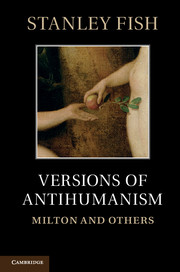Book contents
- Frontmatter
- Contents
- Acknowledgments
- Introduction: intention, historicism and interpretation
- Part I Milton
- Chapter 1 The Brenzel lectures
- Chapter 2 To the pure all things are pure
- Chapter 3 “There is nothing he cannot ask”
- Chapter 4 Why Milton matters; or, against historicism
- Chapter 5 Milton in popular culture
- Chapter 6 How the reviews work
- Chapter 7 The new Milton criticism
- Part II Early modern literature
- Index
Chapter 6 - How the reviews work
Published online by Cambridge University Press: 05 May 2012
- Frontmatter
- Contents
- Acknowledgments
- Introduction: intention, historicism and interpretation
- Part I Milton
- Chapter 1 The Brenzel lectures
- Chapter 2 To the pure all things are pure
- Chapter 3 “There is nothing he cannot ask”
- Chapter 4 Why Milton matters; or, against historicism
- Chapter 5 Milton in popular culture
- Chapter 6 How the reviews work
- Chapter 7 The new Milton criticism
- Part II Early modern literature
- Index
Summary
It is time to say aloud what I have always known: much of my work on Milton has been a gloss on a single sentence in Thomas Kranidas's The Fierce Equation: “Milton is accused of being improper, while Milton accuses his enemies of being wrong” (101). That is (and this is still more of the gloss), for Milton, merely external decorums – whether of style, sentence length, vocabulary, prayer, marriage, and anything else you can think of – are themselves indecorous if they do not issue from an inner decorum that is achieved only by being allied steadfastly to the source of being. This means (among other things) that one cannot judge an action – tearing down the Philistine temple, deciding to fall with and for Eve, rejecting an opportunity to feed the hungry – by its apparent virtue with respect to a system of public or domestic values. Instead, the only judgment that counts (and not everyone is capable of rendering it; it takes one to know one) is the judgment as to whether or not the action is an expression of a loyalty that is entirely interior and therefore not available to empirical verification. By this logic, Milton's “intemperate” language (and this again is part of Kranidas's point) is finally more decorous than the milder language of his opponents because its vehemence is an outward manifestation of the poet's commitment to a master and overriding truth; while, on the other hand, the commitments of his polemical opponents are (or so he would say and often did say) merely strategic and therefore cosmetic and therefore false. And since truth or falsity are here to be understood not as properties of objects or utterances but as properties of what we have come to call “subject positions” (the key question is the Augustinian one: whom do you love?), one cannot calculate the worth or propriety of anything by inspecting surfaces and appearances, a lesson the Satan of Paradise Regained never learns and never could learn so long as he remains Satan.
- Type
- Chapter
- Information
- Versions of AntihumanismMilton and Others, pp. 119 - 130Publisher: Cambridge University PressPrint publication year: 2012



